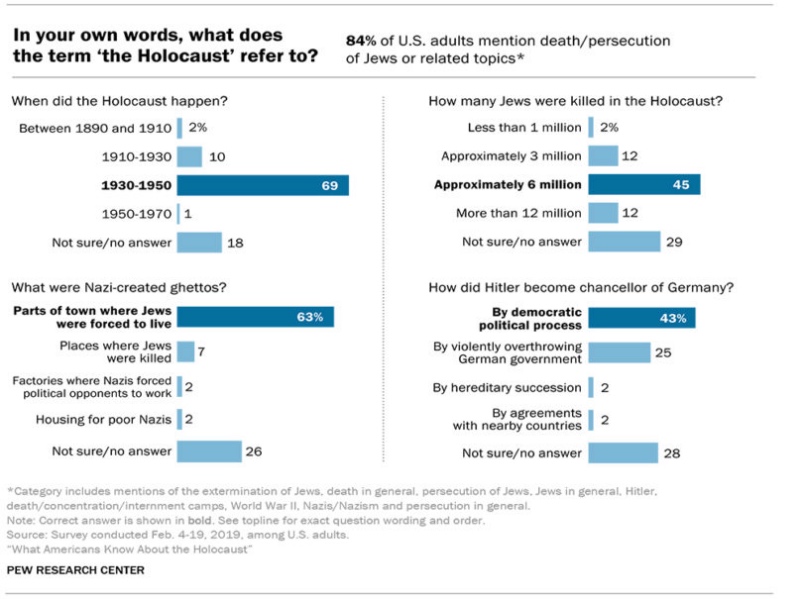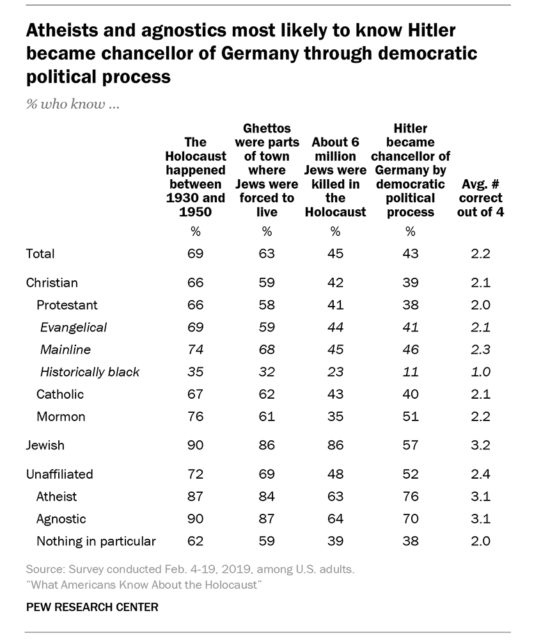A new poll suggests Americans know about the Holocaust, the genocidal campaign against European Jews, but they’re fuzzy on the details.
Most Americans (69 per cent) know the Holocaust took place roughly between 1930 and 1950. And they know the Nazis created ghettos where Jews were forced to live (63 per cent).

But knowledge declines after that. The new Pew Research Center poll of 10,971 Americans shows that fewer than half of Americans can correctly cite the number of Jews killed in the Holocaust – six million – and even fewer correctly answered that Adolf Hitler became chancellor of Germany through a democratic political process.
The poll, which comes amid a rising tide of violent anti-Semitism and much uncertainty over its causes, was released Wednesday, days ahead of International Holocaust Remembrance Day, which falls on Monday. This year’s remembrance day also marks the 75th anniversary of the liberation of Auschwitz.
Israel is marking the event with what is billed as the largest-ever Holocaust forum, starting Thursday. Some 50 world leaders, including Vice President Mike Pence, Russian President Vladimir Putin and French President Emmanuel Macron, are expected to attend.
It is not clear, nor does the poll suggest, that ignorance of the Holocaust leads to anti-Semitism. The poll found that relatively few people polled expressed strongly negative feelings toward Jews.
Ninety per cent of non-Jewish respondents who underestimated the Holocaust’s death toll said they had either “neutral” or “warm” feelings toward Jews, while just one in 10 of that same group gave Jews a “cold” rating – a percentage not much different from the share who express “cold” feelings toward Jews, but who overestimate the number of Holocaust deaths (nine per cent).
Those who knew more about the Holocaust had relatively warmer feelings toward Jews.
Ken Jacobson, deputy national director for the Anti-Defamation League, said he was encouraged by the poll.
“I almost feel a little relieved that at least people know there was such a thing as the Holocaust,” Jacobson said.
“The fact that people don’t know details, even the obvious details, like how many Jews were murdered or much about Hitler, that’s not a reflection of attitudes toward Jews, but a reflection of how history has declined as a subject of interest in America.”

The poll, which was conducted by mobile phone and landline in February, 2019, asked four multiple-choice type questions of respondents: When did the Holocaust happen? What were Nazi-created ghettos? How many Jews were killed in the Holocaust? How did Hitler become chancellor of Germany?
A fifth question allowed respondents to answer in their own words, “As far as you know, what does ‘the Holocaust’ refer to?” About two-thirds said it refers to the attempted annihilation of the Jewish people.
US Jews are grappling with how to stem growing anti-Semitic violence. Five Jews were stabbed at a rabbi’s home during a Hanukkah celebration in December, and weeks earlier a deadly attack at a kosher supermarket in nearby Jersey City, New Jersey, left three dead.
The Anti-Defamation League’s anti-Semitism tracker lists almost daily incidents of vandalism, harassment and assault against Jews, not only in the larger New York metropolitan area but across the nation.
“One of the lessons of the last few years is that Jews are, and always have been, a minority subject to discrimination,” said Jill Jacobs, executive director of T’ruah: The Rabbinic Call for Human Rights.
Not knowing about the Holocaust can lead people to dismiss anti-Semitism or to fail to appreciate how pervasive hatred of the Jews can lead to genocide, she said.
While nearly half of Americans got at least three of the four questions on anti-Semitism right, some groups did better than others. Jews, agnostics and atheists got most of the questions right. Mainline Protestants, Mormons, Catholics, evangelical Protestants and Americans who describe their religion as “nothing in particular” answered about half of the questions correctly.
Black Protestants, however, answered only one out of four questions correctly, on average.
Eric K Ward, executive director of the Western States Center, a civil rights organization in Portland, Oregon, that works on race and gender equality, said education may be one reason for blacks’ lack of knowledge about the Holocaust.
“It is not often that Holocaust education is created and geared toward the black community,” Ward said.
The African American experience in the US may also make it harder for them.
“When a community has faced their own form of discrimination, it sometimes makes it hard to understand that other communities have faced equally traumatizing forms of bigotry,” he added.
The poll found little difference between political parties in levels of Holocaust knowledge. Men tended to know more than women; older adults, especially those 65 and up, knew more than adults ages 18-29.
The questions about the Holocaust were part of a larger Pew survey that explored what Americans know about religion. That survey was published in July.
The margin of sampling error for the poll was plus or minus 1.5 percentage points.





